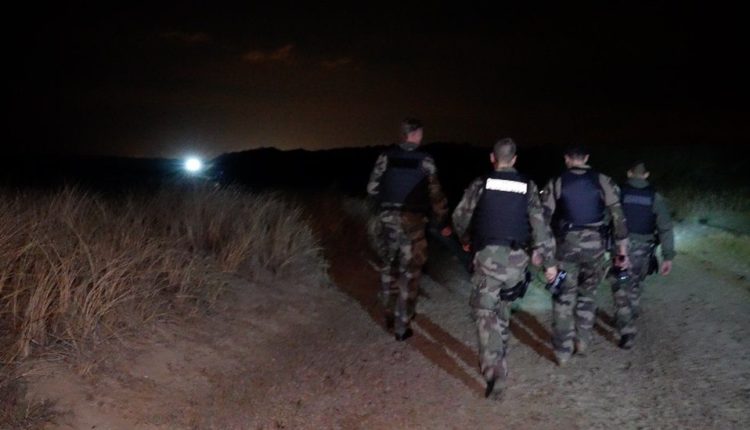Hidden in dense vegetation along the coast north of Calais, two men are quietly piling the pressure on Britain’s new prime minister.
Crouching in the darkness, they swiftly prepare a boat to take migrants across the Channel.
High above them in the pre-dawn gloom, the approaching buzz of a UK-funded drone signals the start of a familiar chase.
Less than a kilometre away, French gendarmes scrutinise the two figures on the drone’s thermal camera; their images a riot of pink and orange.
Within seconds the unit have piled into a special buggy, also provided by the UK, and are bouncing across the sandy scrubland towards the site.
It takes less than five minutes to get there, but the last 50 metres must be covered on foot through thick, spiky vegetation, some of it chest-high.
The two men flee as the unit approaches, leaving behind them the half-prepared boat, the fuel and motor, and two sacks of life-jackets.
“The vegetation works against us,” General Frantz Tavart told me. “The smugglers know this and stash the boats here on purpose.”
The UK drones are valuable, he says, because they spot even well-hidden sites like this one.
“The drone caught this,” he said. “The [surveillance] plane passed over beforehand and didn’t spot it, because it was hidden by the trees.”
This 160km stretch of coastline has sucked in resources, year after year. France and the UK have invested in more patrols, better technology and different kinds of vehicles. And still the numbers crossing the Channel keep growing.
Britain’s new home secretary, Suella Braverman, will give a speech at the Conservative’s party conference later where she’s expected to restate her determination to crack down on the arrivals.
French patrols say they’re stopping around half of all crossing attempts, but more than 30,000 people have still made it to the UK so far this year.
And it’s not just migrants who are finding this route increasingly attractive. New smuggling networks have been reported this summer too.
A senior French official with good knowledge of the situation told us that dedicated Albanian smuggling networks are now operating across the Channel, separately from the main Kurdish and Iraqi networks.
“[The Albanian networks] are more efficient than the others,” he told us. “40% of those we intercept on this side of the Channel are Albanian; but they make up 60% of those who arrive on the other side.”
“Our hypothesis is that they’re a lot more experienced than the others in terms of criminal activity, and more used to organising themselves and avoiding the police. We find the prices are higher for Albanian networks than for the others.”
General Tavart says he can’t confirm whether the new Albanian smuggling routes are being run by established criminal groups, perhaps based in the UK, but he says it would make sense.
“With the price of a crossing around 4,000 euros (£3,482), and around 40 people in one boat, do the maths,” he said. “It’s extremely lucrative, even more so than drug trafficking, and the criminal charges are lighter.”
Source: BBC


Comments are closed.